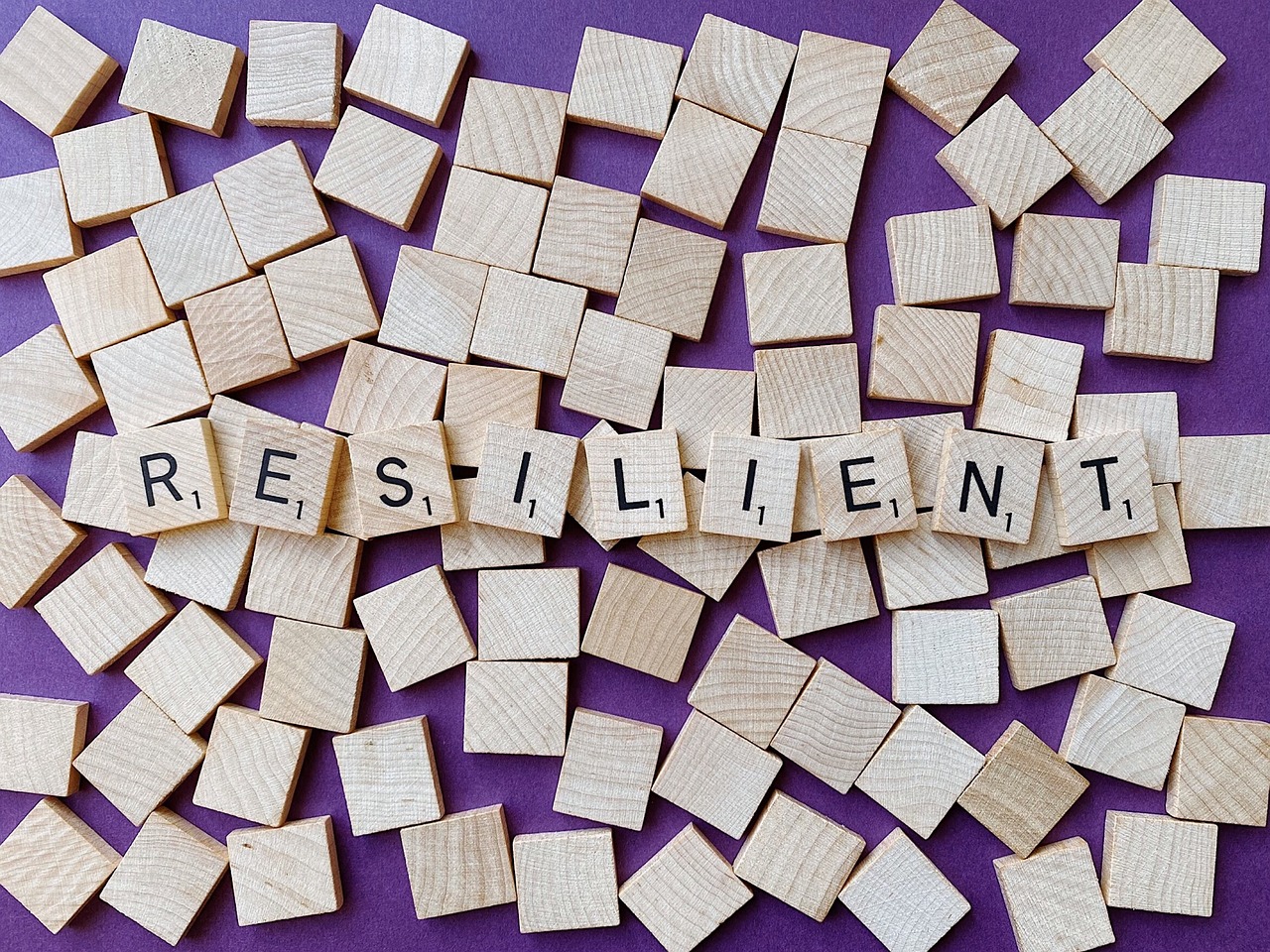The Role of Resilience in Personal and Professional Success
In today's fast-paced world, the concept of resilience has become more crucial than ever. But what exactly does it mean to be resilient? Simply put, resilience is the ability to recover from setbacks, adapt well to change, and keep going in the face of adversity. Think of resilience as your mental muscle; the more you exercise it, the stronger it becomes. This article explores how resilience impacts both personal growth and professional achievements, highlighting its importance, strategies to cultivate it, and its effects on overall success.
At its core, resilience is not just about bouncing back; it's about bouncing forward. It involves a set of characteristics that allow individuals to navigate life's challenges effectively. Resilient people tend to be optimistic, adaptable, and resourceful. They view failures not as dead ends but as opportunities for growth and learning. In a world full of uncertainties, these traits are essential for anyone looking to thrive, both personally and professionally.
Building resilience has profound psychological benefits. It can lead to improved mental health, emotional stability, and overall well-being. When you cultivate resilience, you create a buffer against stress and anxiety, allowing you to maintain a positive mindset even in tough times. Resilient individuals are often better equipped to handle life's ups and downs, leading to a more fulfilling life.
One of the key aspects of resilience is emotional regulation. This ability allows individuals to manage their emotions effectively, especially during challenging situations. When stress levels rise, resilient people can keep their cool and think clearly. Techniques such as deep breathing, journaling, and self-reflection can significantly enhance emotional control. Imagine being in a high-pressure situation at work, yet instead of panicking, you calmly assess the situation and make informed decisions. That's the power of resilience.
Mindfulness practices can significantly strengthen resilience by promoting awareness and acceptance. Techniques like meditation, yoga, and focused breathing help individuals stay grounded in the present moment. By practicing mindfulness, you can develop a greater awareness of your thoughts and feelings, which can lead to improved emotional regulation. It's like having a mental toolkit that you can draw upon whenever life throws a curveball.
Cognitive behavioral strategies are another effective way to foster resilience. These methods focus on reshaping negative thought patterns and building a more resilient mindset. For instance, when faced with a setback, instead of thinking, "I can't do this," a resilient individual might reframe it as, "This is a challenge I can learn from." Such cognitive shifts can make a world of difference in how we approach obstacles.
No one is an island, and strong social support systems play a vital role in resilience. Having a network of friends, family, or colleagues can provide emotional support, encouragement, and practical assistance during tough times. Whether it's sharing a laugh with a friend or seeking advice from a mentor, these connections can help us overcome obstacles and achieve success. Remember, it's not just about what you know; it's also about who you know and how they can help you bounce back.
In professional settings, resilience is crucial for navigating challenges and fostering a positive work environment. Resilient employees are often more engaged, productive, and satisfied with their jobs. They can adapt to changes, manage stress better, and contribute to a supportive workplace culture. This not only benefits the individual but also enhances the overall success of the organization.
Effective leaders demonstrate resilience, influencing their teams positively. Resilient leaders inspire confidence and encourage their teams to embrace challenges. They lead by example, showing that setbacks are merely stepping stones to success. This connection between resilient leadership and organizational success cannot be overstated; it creates a culture where employees feel empowered to take risks and innovate.
Organizations can cultivate resilience within their workforce through targeted training and support. Strategies for developing resilience among employees include:
- Providing workshops on stress management and emotional intelligence.
- Encouraging open communication and feedback.
- Fostering a culture of collaboration and support.
By investing in the resilience of their employees, organizations can enhance overall productivity and create a more dynamic work environment.
Q: What is resilience?
A: Resilience is the ability to recover from setbacks and adapt to change.
Q: Why is resilience important?
A: Resilience helps individuals navigate challenges effectively, leading to personal growth and professional success.
Q: How can I build resilience?
A: You can build resilience by practicing mindfulness, using cognitive behavioral strategies, and fostering strong social support systems.

Understanding Resilience
This article explores how resilience impacts both personal growth and professional achievements. It discusses the importance of resilience, strategies to cultivate it, and its effects on overall success.
Resilience is more than just a buzzword; it’s a vital skill that empowers individuals to face challenges head-on. At its core, resilience is the ability to bounce back from adversity, setbacks, or difficult situations. Imagine a rubber band: when you stretch it, it can return to its original shape. Similarly, resilient individuals can recover from hardships and emerge even stronger. But what exactly does resilience entail?
Resilience encompasses several key characteristics, including adaptability, perseverance, and a positive outlook. It’s not about avoiding stress or hardship; it's about how we respond to it. Resilient people view challenges as opportunities for growth rather than insurmountable obstacles. They possess a unique mindset that allows them to navigate life’s ups and downs effectively.
One of the primary reasons resilience is essential is that life is unpredictable. We all face challenges—be it in our personal lives or professional careers. Resilience helps us to not only cope with these challenges but to thrive despite them. It’s like sailing a boat through turbulent waters; a skilled sailor knows how to adjust the sails to keep moving forward, even when the waves are high.
Furthermore, resilience is crucial for mental health. Individuals who cultivate resilience are often better equipped to handle stress, anxiety, and depression. They can maintain emotional stability, which is essential for overall well-being. To illustrate this, consider the following benefits of resilience:
| Benefit | Description |
|---|---|
| Improved Mental Health | Resilient individuals tend to experience lower levels of anxiety and depression. |
| Enhanced Problem-Solving Skills | They are better at finding solutions during crises, leading to effective decision-making. |
| Stronger Relationships | Resilience fosters better communication and support among peers and loved ones. |
In summary, understanding resilience is the first step towards developing it. It’s a powerful tool that not only helps us manage our reactions to stress but also enhances our overall quality of life. So, how can you start building your resilience today? The journey begins with self-awareness and a willingness to embrace change.
- What is resilience? Resilience is the ability to recover from setbacks and adapt well to change and adversity.
- Can resilience be learned? Yes, resilience can be developed through various strategies and practices.
- Why is resilience important? It helps individuals cope with stress, enhances mental health, and fosters personal and professional growth.

The Psychological Benefits of Resilience
Building resilience is not just about enduring tough times; it’s about thriving in the face of adversity. Resilience acts as a buffer against life's inevitable challenges, and its psychological benefits are profound. When we cultivate resilience, we unlock a treasure trove of mental health advantages that can enhance our overall well-being. Imagine resilience as a sturdy shield that protects our mental state from the arrows of stress and anxiety. It allows us to bounce back from setbacks and emerge stronger than before.
One of the most significant psychological benefits of resilience is the improvement in mental health. Resilient individuals tend to experience lower levels of depression and anxiety. Why is this? Because resilience fosters a positive mindset. When faced with difficulties, resilient people are more likely to view challenges as opportunities for growth rather than insurmountable obstacles. This shift in perspective can lead to a more optimistic outlook on life, which is crucial for maintaining mental health.
Moreover, resilience enhances emotional stability. It provides individuals with the tools to manage their emotions effectively, especially during turbulent times. For instance, when stress levels rise, resilient individuals are better equipped to regulate their feelings and avoid becoming overwhelmed. This emotional regulation is key to maintaining a sense of control and balance in life. It’s like having an internal compass that guides you through the stormy seas of life.
Resilience plays a pivotal role in emotional regulation, which refers to our ability to manage and respond to emotional experiences. When we develop resilience, we learn to navigate stress and anxiety more effectively. This is essential because, let’s face it, life can throw some curveballs our way. Techniques such as deep breathing, journaling, and positive self-talk can help us develop this emotional control. By practicing these techniques, we can transform negative emotions into constructive actions, allowing us to face challenges head-on.
One effective way to strengthen resilience is through mindfulness practices. Mindfulness promotes awareness and acceptance, enabling individuals to stay grounded in the present moment. Techniques such as meditation, yoga, and mindful breathing can help cultivate this awareness. For example, when you find yourself overwhelmed by stress, taking a few minutes to practice mindfulness can help you regain clarity and focus. It’s like hitting the reset button on your mind, allowing you to approach challenges with a fresh perspective.
Another powerful approach to building resilience is through cognitive behavioral strategies. These strategies focus on reshaping negative thought patterns and fostering a more resilient mindset. For instance, when faced with a setback, instead of dwelling on the failure, resilient individuals might ask themselves, “What can I learn from this experience?” This reframing technique helps to shift the focus from the problem to potential solutions, empowering individuals to take action rather than remain stuck in despair.
Let’s not forget the importance of social support systems in fostering resilience. Having strong relationships and a supportive community can significantly enhance our ability to cope with challenges. When we face difficulties, it’s our friends, family, and colleagues who often provide the encouragement and support we need to persevere. Engaging with a supportive network not only boosts our resilience but also contributes to our overall happiness and emotional well-being. It’s like having a safety net that catches us when we fall, allowing us to rise again with renewed strength.
In summary, the psychological benefits of resilience are vast and varied. From improved mental health and emotional stability to enhanced emotional regulation and the importance of social support, resilience is a crucial component of our psychological well-being. By actively cultivating resilience through mindfulness, cognitive strategies, and strong relationships, we can navigate life’s challenges with greater ease and emerge victorious.
- What is resilience? Resilience is the ability to bounce back from adversity and adapt to challenging situations.
- How can I build resilience? You can build resilience through mindfulness practices, cognitive behavioral strategies, and by fostering strong social support systems.
- Why is resilience important? Resilience is important because it helps improve mental health, emotional stability, and the ability to cope with stress.

Emotional Regulation
Emotional regulation is like having a personal umbrella on a rainy day; it helps you navigate through life's storms without getting drenched in negativity. When we talk about resilience, emotional regulation is a crucial element that allows individuals to manage their emotions effectively, especially during challenging times. It’s not just about suppressing feelings but rather understanding and channeling them appropriately. Imagine you're in a high-pressure situation at work, and instead of succumbing to anxiety, you harness that energy to focus and perform better. That's the power of emotional regulation!
One of the key aspects of emotional regulation is recognizing your triggers—those situations or interactions that provoke strong emotional responses. By identifying these triggers, you can develop strategies to cope with them. For instance, if you know that public speaking makes you anxious, you can prepare thoroughly or practice relaxation techniques beforehand. This proactive approach not only reduces anxiety but also builds your confidence, enhancing your overall resilience.
Moreover, emotional regulation can significantly improve your relationships. When you manage your emotions well, you communicate more effectively and respond to others with empathy. This creates a positive feedback loop where your emotional stability fosters stronger connections, which in turn provides a robust support system during tough times. Think of it as planting seeds in a garden; the more you nurture your emotional health, the more fruitful your relationships will become.
To develop emotional regulation skills, consider incorporating the following techniques into your daily routine:
- Self-awareness: Take time to reflect on your emotions and understand how they influence your thoughts and actions.
- Breathing exercises: Simple techniques like deep breathing can help calm your mind and body, allowing you to respond rather than react.
- Journaling: Writing down your thoughts and feelings can provide clarity and help you process your emotions constructively.
- Seeking feedback: Sometimes, an outside perspective can illuminate blind spots in your emotional responses.
Incorporating these strategies into your life can transform how you handle stress and adversity, making you more resilient. Remember, emotional regulation is not a one-time fix; it’s a continuous journey. Just like building muscle, it requires consistent effort and practice. The more you work on it, the stronger and more adaptable you become in the face of challenges.

Mindfulness Practices
Mindfulness practices are like a gentle breeze on a hot summer day—they bring a sense of calm and clarity amidst the chaos of life. In our fast-paced world, where distractions are just a click away, cultivating mindfulness can significantly enhance our resilience. But what exactly does it mean to be mindful? Essentially, mindfulness is the art of being present in the moment, fully engaged with our thoughts, feelings, and surroundings without judgment. It’s about tuning into the here and now, rather than getting lost in the whirlwind of past regrets or future anxieties.
One of the most effective mindfulness techniques is meditation. Just imagine sitting quietly, focusing on your breath, and allowing your thoughts to drift by like clouds in a vast sky. This practice not only helps in reducing stress but also improves emotional regulation. By regularly engaging in meditation, individuals can train their minds to respond to challenges with poise and composure. Research has shown that even a few minutes of daily meditation can lead to profound changes in one’s mental landscape, fostering a more resilient mindset.
Another powerful mindfulness practice is the body scan. This technique involves mentally scanning your body from head to toe, paying attention to any sensations or areas of tension. It’s a fantastic way to reconnect with your physical self and release pent-up stress. By acknowledging where you hold tension, you can consciously work on relaxing those areas, promoting a sense of overall well-being. Think of it as giving your body a little tune-up, ensuring everything is running smoothly.
Mindfulness can also be integrated into daily activities. Whether you’re eating, walking, or even washing the dishes, being fully present can transform mundane tasks into opportunities for mindfulness practice. For instance, during meals, take the time to savor each bite. Notice the flavors, textures, and aromas. This not only enhances your experience but also cultivates gratitude and appreciation, which are essential for building resilience.
To further enrich your mindfulness journey, consider incorporating mindful breathing exercises. These exercises are simple yet incredibly effective. Whenever you feel overwhelmed, take a moment to focus on your breath. Inhale deeply through your nose, hold it for a few seconds, and then exhale slowly through your mouth. Repeat this process several times. You’ll find that this simple act can ground you, clear your mind, and enhance your ability to cope with stressors.
Incorporating these practices into your daily routine can create a significant shift in how you handle life’s challenges. By embracing mindfulness, you’re not just learning to manage stress; you’re building a foundation of resilience that will support you through thick and thin. Remember, resilience is not about avoiding difficulties but about facing them with a calm and collected spirit, and mindfulness is a powerful ally in that journey.
- What is mindfulness? Mindfulness is the practice of being fully present and engaged in the moment, without judgment.
- How can mindfulness improve resilience? Mindfulness enhances emotional regulation and helps individuals cope better with stress and adversity.
- What are some simple mindfulness practices? Simple practices include meditation, body scans, mindful eating, and mindful breathing exercises.
- How long should I practice mindfulness each day? Even a few minutes of mindfulness practice each day can lead to significant benefits. Start small and gradually increase the duration as you feel comfortable.

Cognitive Behavioral Strategies
Cognitive Behavioral Strategies (CBS) are powerful tools that can help individuals reshape their thought patterns and behaviors, ultimately fostering resilience. At its core, CBS is about recognizing and altering negative thinking that often leads to feelings of helplessness or defeat. Imagine your mind as a garden; if you allow weeds (negative thoughts) to take over, they can choke out the flowers (positive thoughts) that bring you joy and fulfillment. By employing CBS, you can cultivate a flourishing garden of positivity and strength, enabling you to bounce back from adversity with greater ease.
One of the fundamental principles of CBS is the cognitive restructuring process. This involves identifying distorted thoughts that contribute to stress and anxiety. For instance, if you find yourself thinking, "I always fail at everything," challenge that thought by asking, "Is that really true?" Often, a more balanced thought might be, "I have faced challenges before and learned from them." This shift in perspective can be incredibly empowering, helping you to see setbacks as opportunities for growth rather than insurmountable obstacles.
Another effective strategy is to engage in behavioral activation. This means proactively engaging in activities that bring you joy or a sense of accomplishment, even when you don't feel like it. Think of it as a snowball effect; once you start participating in positive activities, your mood can lift, making it easier to tackle challenges. For example, if you're feeling overwhelmed at work, taking a short walk or spending time on a hobby can recharge your mental batteries and enhance your resilience.
Additionally, practicing self-monitoring can be a game-changer. Keeping a journal to track your thoughts and feelings can provide insights into patterns that may be holding you back. By regularly reflecting on your experiences, you can identify triggers that lead to negative thinking and develop strategies to counteract them. For instance, if you notice that certain situations consistently lead to anxiety, you can prepare yourself in advance with coping strategies, thus enhancing your resilience.
Incorporating these strategies into your daily routine can significantly improve your emotional well-being. To help you get started, here’s a quick overview of some effective Cognitive Behavioral Strategies:
| Strategy | Description |
|---|---|
| Cognitive Restructuring | Identifying and challenging negative thought patterns. |
| Behavioral Activation | Engaging in enjoyable or fulfilling activities to boost mood. |
| Self-Monitoring | Keeping a journal to track thoughts, feelings, and triggers. |
By implementing these strategies, you can create a more resilient mindset. Remember, resilience is not about avoiding difficulties; it's about developing the skills to manage and overcome them. As you practice these strategies, you'll find that your ability to cope with life's challenges improves, leading to greater personal and professional success.
- What is resilience? Resilience is the ability to recover from setbacks, adapt well to change, and keep going in the face of adversity.
- How can I develop resilience? You can develop resilience by practicing cognitive behavioral strategies, building strong relationships, and engaging in mindfulness practices.
- Why is resilience important? Resilience is crucial because it helps you navigate life's challenges, maintain mental health, and achieve personal and professional goals.

Social Support Systems
When we talk about resilience, we can't overlook the **crucial role** that social support systems play in our lives. Think of resilience as a tree; while the trunk represents our inner strength, the roots symbolize the connections we have with others. These connections provide the necessary nutrients that help us weather life's storms. In essence, having a strong support system can significantly enhance our ability to bounce back from challenges and adversity. Whether it’s friends, family, or colleagues, the people around us can either uplift our spirits or drain our energy. So, how does this work?
First off, social support can be categorized into different types: emotional, informational, and tangible support. Emotional support comes from those who listen to us, validate our feelings, and offer empathy. Informational support consists of advice or guidance, while tangible support includes physical help, like lending a hand during tough times. Each type plays a **vital role** in building our resilience. For instance, when you're feeling overwhelmed, a friend who listens can make a world of difference. It's like having a safety net; when you fall, they catch you, allowing you to regain your balance.
Moreover, research shows that individuals with strong social support systems are more likely to experience better mental health outcomes. They tend to manage stress more effectively and recover from setbacks faster. This is particularly important in professional settings, where the pressure can be intense. Imagine working in a high-stakes environment without anyone to lean on; the stress can become unbearable. In contrast, a supportive workplace fosters collaboration, encourages open communication, and ultimately leads to a more resilient team.
It's also worth noting that social support is not just about receiving help; it’s about **reciprocity**. Being there for others can enhance your own resilience. When you provide support, you strengthen your relationships and create a sense of belonging. This two-way street enriches both parties involved, making the bond even more robust.
To illustrate the impact of social support systems, consider the following table that summarizes the benefits of having a strong support network:
| Type of Support | Benefits |
|---|---|
| Emotional Support | Improves mood, reduces feelings of isolation |
| Informational Support | Provides guidance, helps in decision-making |
| Tangible Support | Offers practical help, alleviates burdens |
In conclusion, nurturing your social support system is not just beneficial; it’s essential for building resilience. Make it a priority to connect with others, whether it’s through joining groups, attending events, or simply reaching out to friends. The stronger your relationships, the better equipped you will be to face life's challenges. Remember, resilience is not a solitary endeavor; it thrives in the company of others. So, go ahead and invest in those connections—they are your lifeline in tough times!

Resilience in the Workplace
In today's fast-paced and ever-changing work environment, resilience is more than just a buzzword; it’s a critical skill that can determine success or failure. Imagine navigating through a stormy sea without a sturdy ship—this is what working without resilience feels like. When faced with challenges such as tight deadlines, unexpected changes, or workplace conflicts, resilient employees are those who not only survive but thrive. They adapt, learn, and emerge stronger from their experiences, making them invaluable assets to any organization.
Resilience in the workplace fosters a culture of adaptability and innovation. Employees who possess resilience are more likely to embrace change rather than resist it. This ability to pivot quickly in response to new challenges creates an environment where creativity flourishes. For instance, a team that can bounce back from setbacks will likely brainstorm more effectively, leading to innovative solutions and improved productivity. Moreover, resilient individuals often inspire their colleagues, creating a ripple effect that enhances overall team morale.
Furthermore, resilience is closely linked to employee satisfaction. When workers feel equipped to handle challenges, they experience less stress and greater job satisfaction. This emotional stability not only improves individual performance but also strengthens team dynamics. Organizations that prioritize resilience often report lower turnover rates and higher employee engagement. In fact, studies have shown that resilient teams are 30% more productive than their less resilient counterparts. This is why investing in resilience training is not just a good idea—it's a smart business strategy.
To cultivate resilience within the workplace, organizations can implement various strategies. Here are some effective methods:
- Training Programs: Offering workshops focused on stress management, emotional intelligence, and adaptability can equip employees with the tools they need to become more resilient.
- Encouraging Open Communication: Creating a safe space for employees to express their concerns and challenges fosters a supportive environment where resilience can thrive.
- Promoting Work-Life Balance: Encouraging employees to take breaks, use their vacation time, and maintain a healthy work-life balance can significantly enhance their ability to cope with stress.
It's essential for leaders to model resilience as well. When leaders demonstrate a positive attitude in the face of adversity, it sets a tone for the entire organization. Employees are more likely to adopt similar behaviors when they see their leaders navigating challenges with grace and determination. This connection between leadership and resilience is profound; resilient leaders not only influence their teams positively but also drive the organization towards achieving its goals.
In conclusion, resilience in the workplace is not just beneficial; it’s essential for both individual and organizational success. By fostering a resilient culture, businesses can enhance employee satisfaction, boost productivity, and create an environment where innovation thrives. In a world where change is the only constant, resilience is the anchor that keeps organizations steady amidst the storm.
Q1: How can I develop resilience in my workplace?
A1: Start by implementing training programs focused on stress management and emotional intelligence. Encourage open communication and promote a healthy work-life balance.
Q2: What are the signs of a resilient employee?
A2: Resilient employees tend to adapt quickly to change, maintain a positive attitude during challenges, and support their colleagues in overcoming obstacles.
Q3: Why is resilience important in leadership?
A3: Resilient leaders inspire their teams, foster a positive work environment, and drive organizational success by effectively navigating challenges.

Leadership and Resilience
In the fast-paced world of business, the connection between leadership and resilience cannot be overstated. Effective leaders are often those who can navigate through storms, adapting to changes while maintaining a clear vision. Think of resilience as the backbone of leadership; it not only supports leaders during turbulent times but also empowers them to inspire their teams. A leader’s ability to remain steadfast in the face of adversity sets the tone for the entire organization, creating a ripple effect that encourages team members to cultivate their own resilience.
Resilient leaders possess certain characteristics that help them thrive, even when challenges arise. They demonstrate a strong sense of emotional intelligence, allowing them to connect with their teams on a deeper level. This connection fosters trust and loyalty, which are crucial during difficult times. Moreover, resilient leaders are adept at problem-solving; they view obstacles as opportunities for growth rather than insurmountable barriers. This perspective not only enhances their own resilience but also encourages their teams to adopt a similar mindset.
One of the most important aspects of resilient leadership is the ability to communicate effectively. During times of crisis, clear and transparent communication becomes essential. Leaders who share their vision, acknowledge challenges, and provide updates can alleviate uncertainty among their teams. This approach not only builds confidence but also fosters a sense of community. When employees feel informed and valued, they are more likely to remain engaged and committed, even when the going gets tough.
Moreover, resilient leaders understand the value of self-care. They recognize that to lead effectively, they must first take care of their own mental and emotional well-being. This might involve practices like setting boundaries, seeking support, or engaging in mindfulness activities. By prioritizing their own resilience, leaders model healthy behaviors for their teams, demonstrating that self-care is not a luxury but a necessity for sustained success.
In a nutshell, resilient leadership is about more than just bouncing back from setbacks; it's about cultivating an environment where resilience can flourish at all levels of the organization. By fostering a culture of resilience, leaders can empower their teams to face challenges head-on, ultimately leading to greater innovation and success. In this way, resilience becomes a shared value that drives organizational growth and strengthens the fabric of the workplace.
- What is resilience in leadership?
Resilience in leadership refers to a leader's ability to adapt and thrive in the face of challenges, maintaining a positive outlook and inspiring their team to do the same.
- How can leaders build resilience?
Leaders can build resilience by practicing emotional intelligence, communicating effectively, prioritizing self-care, and fostering a supportive team environment.
- Why is resilience important for teams?
Resilience is important for teams because it helps them navigate challenges more effectively, encourages problem-solving, and fosters a sense of community and support.

Building a Resilient Workforce
Creating a resilient workforce is not just a buzzword; it’s a necessity in today’s fast-paced and often unpredictable work environment. When we talk about resilience in the workplace, we're referring to the ability of employees to adapt to challenges, bounce back from setbacks, and thrive despite adversity. But how do organizations go about building this resilience? It’s a multifaceted approach that involves training, support, and a culture that encourages growth and learning.
First and foremost, training programs are essential. These programs should focus on developing both hard and soft skills that empower employees to face challenges head-on. For example, workshops on stress management, time management, and effective communication can equip teams with the tools they need to navigate difficult situations. Moreover, organizations can implement resilience training sessions that teach employees how to cultivate a positive mindset and develop coping strategies. Imagine an employee who faced a significant setback on a project; with the right training, they could view this as an opportunity to learn rather than a failure.
Additionally, fostering a supportive environment is crucial. Employees need to feel that they can rely on their colleagues and supervisors during tough times. This can be achieved through mentorship programs where experienced employees guide newer team members. A strong mentorship can act as a safety net, providing reassurance and advice when challenges arise. Furthermore, promoting open communication within teams encourages individuals to share their struggles and seek help without fear of judgment. After all, isn’t it comforting to know that you’re not alone in facing workplace challenges?
Organizations should also encourage a culture of feedback and recognition. Regular feedback helps employees understand their strengths and areas for improvement, fostering a growth mindset. When employees feel recognized for their efforts, it boosts their morale and motivates them to push through challenges. Consider implementing a recognition program that celebrates both small wins and major accomplishments. This not only builds resilience but also enhances overall job satisfaction.
Moreover, it’s vital to promote work-life balance. Encouraging employees to take breaks, use their vacation days, and disconnect after work hours can significantly reduce burnout and enhance resilience. When employees feel balanced in their personal and professional lives, they are more equipped to handle stress and challenges at work. Think of it this way: a well-rested employee is like a well-tuned engine; they perform better and are less likely to break down under pressure.
Lastly, organizations can utilize wellness programs that focus on both physical and mental health. These programs can include yoga classes, mindfulness sessions, and mental health resources. By investing in employees’ overall well-being, companies not only cultivate resilience but also create a healthier workplace environment. A resilient workforce is one where employees feel valued and supported, leading to increased productivity and lower turnover rates.
In conclusion, building a resilient workforce is an ongoing process that requires commitment and strategy. By implementing training programs, fostering a supportive environment, encouraging feedback and recognition, promoting work-life balance, and investing in wellness, organizations can cultivate resilience among their employees. This not only prepares them to face challenges but also positions the organization for long-term success. After all, a resilient team is a powerful team!
- What is workplace resilience?
Workplace resilience refers to the ability of employees to adapt to challenges and bounce back from setbacks while maintaining productivity and morale. - How can organizations support employee resilience?
Organizations can support resilience through training programs, mentorship, open communication, recognition, and wellness initiatives. - Why is resilience important in the workplace?
Resilience is crucial as it helps employees manage stress, adapt to change, and maintain high levels of performance, even in difficult situations.
Frequently Asked Questions
-
What is resilience, and why is it important?
Resilience is the ability to bounce back from challenges and setbacks. It's crucial because it enables individuals to navigate life's ups and downs with a positive attitude, enhancing both personal growth and professional success. Think of resilience as the mental rubber band that stretches but doesn’t break under pressure!
-
How can I build resilience in my daily life?
Building resilience can be achieved through various strategies, such as practicing mindfulness, developing emotional regulation skills, and fostering strong social connections. By integrating these practices into your routine, you'll create a solid foundation that helps you cope with stress and adversity more effectively.
-
What role does emotional regulation play in resilience?
Emotional regulation is a key component of resilience. It allows individuals to manage their emotions during stressful situations, leading to better decision-making and overall well-being. Techniques like deep breathing, journaling, and positive self-talk can enhance your ability to regulate emotions and maintain a resilient mindset.
-
Can mindfulness practices really help with resilience?
Absolutely! Mindfulness practices, such as meditation and deep breathing, promote awareness and acceptance of the present moment. This heightened awareness can help you respond to challenges with a calm and focused mind, ultimately strengthening your resilience and emotional health.
-
How does social support contribute to resilience?
Strong social support systems are vital for resilience. Having a network of friends, family, or colleagues can provide emotional backing and practical assistance during tough times. It's like having a safety net that catches you when you fall, making it easier to rise again!
-
What is the connection between resilience and workplace success?
In the workplace, resilience is essential for overcoming challenges and maintaining a positive environment. Resilient employees tend to be more adaptable, engaged, and productive, which contributes to overall organizational success. It's all about fostering a culture where bouncing back is celebrated!
-
How can organizations cultivate resilience among their employees?
Organizations can promote resilience through training programs, workshops, and supportive policies that encourage open communication and teamwork. By investing in employee well-being and resilience-building initiatives, companies can enhance productivity and job satisfaction.
-
What is resilient leadership, and why is it important?
Resilient leadership refers to the ability of leaders to remain composed and effective during crises. This quality is important as it sets a tone for the team, inspiring confidence and encouraging a resilient culture within the organization. Resilient leaders are like captains steering their ships through stormy seas, guiding their teams toward calmer waters.



















